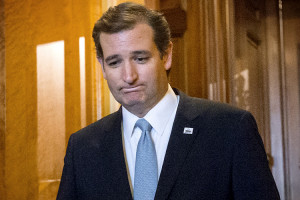Senator Ted Cruz (R-Alberta Texas), a “Tea Party” Republican and ostensibly a champion of states’ rights, is unhappy with President Obama’s decision to not round up marijuana users in Washington and Colorado:
“A whole lot of folks now are talking about legalizing pot. The brownies you had this morning, provided by the state of Colorado,” he jokingly said during his keynote speech at Texas Public Policy Foundation’s Policy Orientation.
Oh Ted, what a knee-slapper!
“And you can make arguments on that issue,” Cruz continued. “You can make reasonable arguments on that issue. The president earlier this past year announced the Department of Justice is going to stop prosecuting certain drug crimes. Didn’t change the law.”
The problem, as Cruz sees it, isn’t just limited to Obama’s decision to not interfere with Washington’s and Colorado’s legalization of marijuana. The president is running the government like a “corrupt dictator” and only enforcing the laws that suit him. And perhaps Cruz has a point. But let’s look at a list of Cruz’ complaints:
Cruz is on solid ground when criticizing Obama’s unilateral delay of the ACA employer mandate. He simply doesn’t have the executive authority to make such a decision, as a lawsuit filed in October to block the delay argued. But it all falls apart when Cruz goes after Obama on immigration and drug policy.
For one, discretion in law enforcement is not the same thing as suspending a law. Prosecutors have always had substantial leeway in choosing which cases to pursue and what evidence to present, so Obama’s directives to immigration and Justice officials on relaxing deportation rules and drug offense indictments is not flouting the law but simply changing the enforcement strategy. This is not uncommon.
But more to the point, Cruz is attacking Obama for not strictly enforcing immoral laws. No government has moral authority to use violence against people, especially so when those people have violated no one’s rights. Smoking a plant and crossing imaginary political borders are crimes only because the state has declared them so. It’s blindingly clear that the federal government has no compelling interest in criminalizing drugs nor does it have a constitutional mandate to do so. And arguably it need not have jurisdiction over immigration enforcement — the constitution provides for federal authority over naturalization, or the laws and process by which one becomes a citizen. A states’ rights advocate, as Tea Party Republicans purport to be, might argue that border enforcement is the domain of border states.
Cruz seems to be repudiating both a cornerstone of the new Republican grassroots platform, and arguing for more federal infrastructure to maintain policies any true conservative should oppose. This is the sort of cognitive dissonance, not to mention rank hypocrisy, that keeps Republicans so woefully out of step with much of the nation.



 Last month, I wrote in the Libertarian Standard about Twilight Zone creator Rod Serling and the end of the Golden Age of Television — and about Serling’s preference for government interference over that of the advertisers.
Last month, I wrote in the Libertarian Standard about Twilight Zone creator Rod Serling and the end of the Golden Age of Television — and about Serling’s preference for government interference over that of the advertisers.